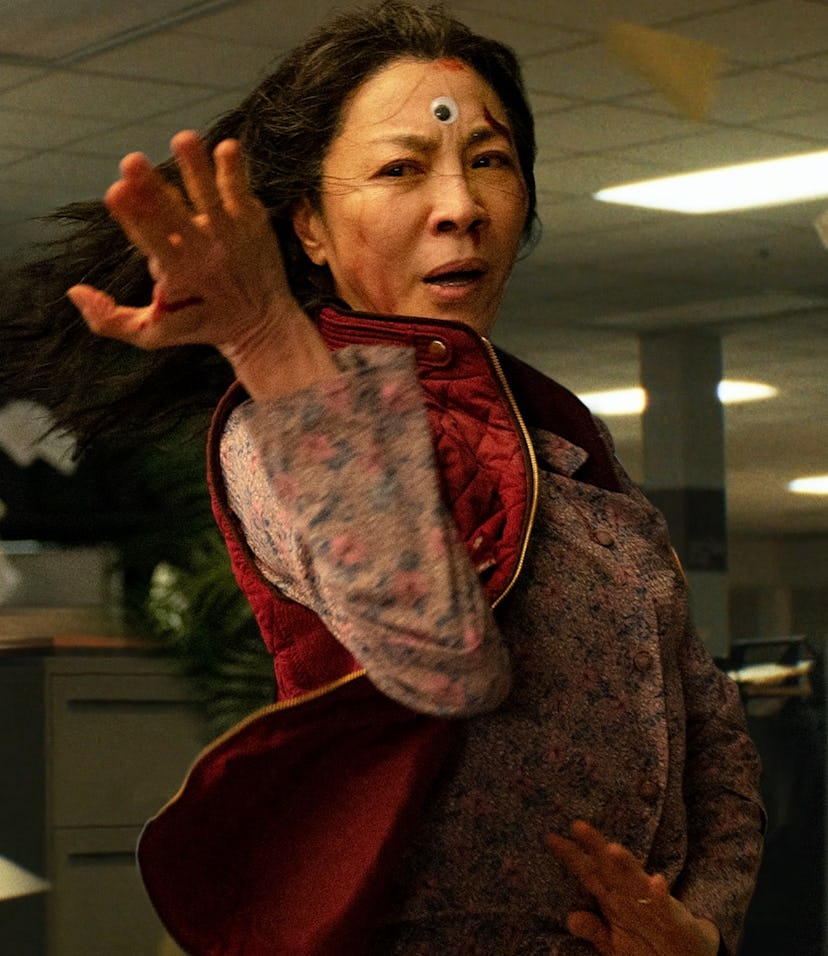Movies

Everything Everywhere All At Once Was Like Peering Into My Mother's Psyche
Evelyn’s challenge is not to slay anyone but to compassionately accept them.
My favorite movie to rewatch with my mom is Lord of the Rings. If an outsider were to catch a glimpse, it might look funny — two adult Asian women debating the relative hotness of various hobbits — and it’s true, there’s not a lot of common culture between us and this all-white, all-male band of bros. But we love an epic tale of heroism, and when no popular movies depict people like you, you take what you can. So when I watched Everything Everywhere All At Once, starring 59-year-old Michelle Yeoh, my mind was blown. Here’s a movie that not only features a working class immigrant mom as an ass-kicking action hero, but that gives garden variety conflict between mother and daughter the dramatic stakes of LOTR.
Note: This article contains spoilers for the film.
The film centers on Evelyn Wang, a Chinese-American laundromat owner barely holding it together while secretly roiling with rage and frustration. While sitting in the IRS office, she’s called away by a messenger from another universe and told she must connect with parallel versions of herself to fight an all-powerful villain who (spoiler) turns out to be an evil version of her adult daughter, Joy. Meanwhile, her regular life appears to go on as normal, making it an apt metaphor for inner turmoil.
Watching the movie felt like peering into my mother’s psyche. I saw her in Evelyn’s perseverance in the face of exhaustion. Where Evelyn dwelled among mountains of laundry bags, my mother, a public school teacher, seemed never not buried in student papers to grade. I saw her in Evelyn’s love-by-way-of-biting-criticisms, which I think might’ve made some viewers sad but made me (and the other Asian viewers in the theater) laugh out loud. And I saw her in the way Evelyn holds tight to her own right to harbor an imagination, much like my mother, who somehow found the time to publish poetry while working full-time and raising kids.
In her new book I'll Show Myself Out: Essays on Midlife and Motherhood, Jessi Klein describes having the epiphany that being a mom, for all of its everyday tedium, is a “hero’s journey” — the mythological trope of a person (nearly always male) being called away to an important quest. Yet, Klein writes, “in popular culture, at least in America for the past forever years, what mothers do is seen as so unremarkable it’s not just an unimportant story but not even a story at all.”
Everything changes all of that. It shows how a small spat with one’s child can feel like slaying a fleet of supercharged villains, and worrying about that child’s commonplace problems can feel like being sucked into the deepest, darkest hole in the multiverse. In fact, of all Joy’s “offenses,” which mainly consist of totally normal things like being (in her mother’s opinion) slightly overweight and getting a tattoo, the one that seems to torment her mother most is her being apparently depressed. Perhaps the idea that Joy could be unhappy, after everything Evelyn has done and sacrificed for her, is the one blow that her mother almost can’t bear. Ironically, part of Joy’s sadness seems to be related to her own concern for Evelyn and her guilt around contributing to her mother’s angst. They’re in a negative feedback loop in which caring too much is a form of torment. Having been an angsty young adult myself, their dynamic felt all too familiar.
The idea that mothers might regret their choices at all is deeply edgy to show in film because it hints that they might regret their own children.
To appreciate how truly radical this movie is, one has to look at the context. In a study of 1,300 popular films, only 5% of characters were Asian-American Pacific Islanders. Not a single one stars an Asian woman over 40. Older white women don’t fare much better. In another study analyzing the top films of 2019, none starred female leads over 50, and when women over 50 appeared at all they were often “senile, homebound, feeble, or frumpy.”
While a number of movies deal with mothering young children, few explore the challenges of being a parent to an adult child. This lack of representation, obviously problematic in a political sense, also has personal consequences when stories of motherhood — so often a large part of an older woman’s narrative arc — remain invisible. If we never give older mothers’ struggles their due on screen, we may have a hard time understanding them as multi-dimensional people with rich inner lives complete with fantasies of “paths not taken.” The idea that mothers might regret their choices at all is deeply edgy to show in film because it hints that they might regret their own children. But by allowing Evelyn this complexity, we can view her choosing her family as the heroic act that it is.
Yet even while Everything fits the hero’s journey trope, it also defies it. It is, after all, not a western tale of a male warrior, but a story about a woman that incorporates Eastern philosophies. Evelyn’s challenge is not to slay anyone but to compassionately accept them. Now that I’m a mother, I see myself in Evelyn, too. My daughter may be only a baby, but I can already feel myself projecting my own regrets and hopes onto her. My quest will be the same as my mother’s and the same as Evelyn’s: to love my child by allowing her to be her own person. To hold on by letting go.
This article was originally published on